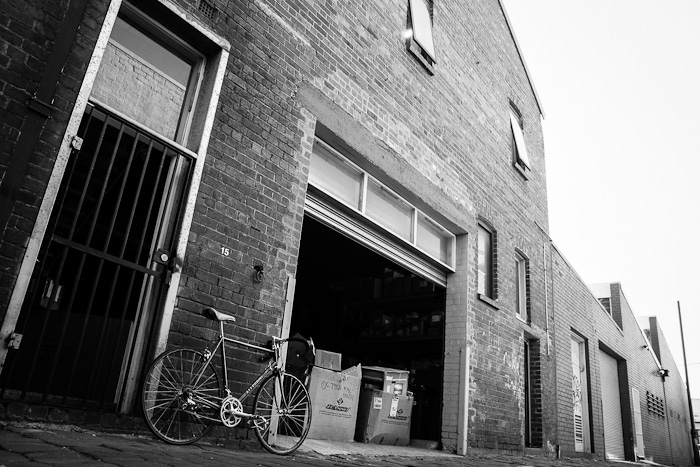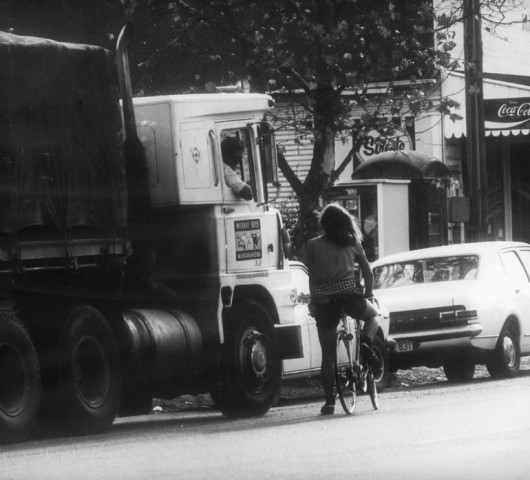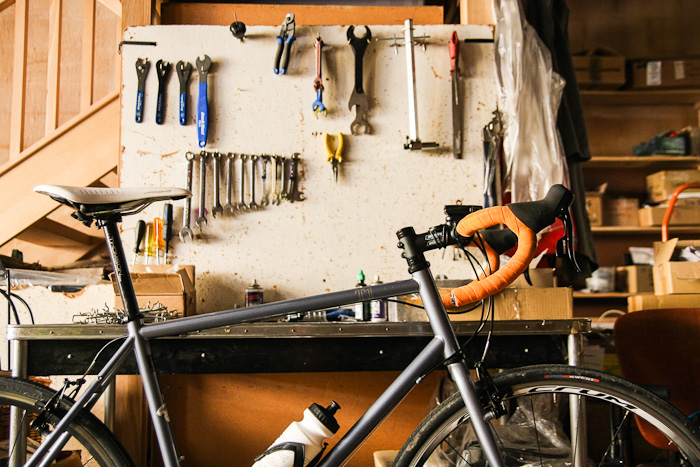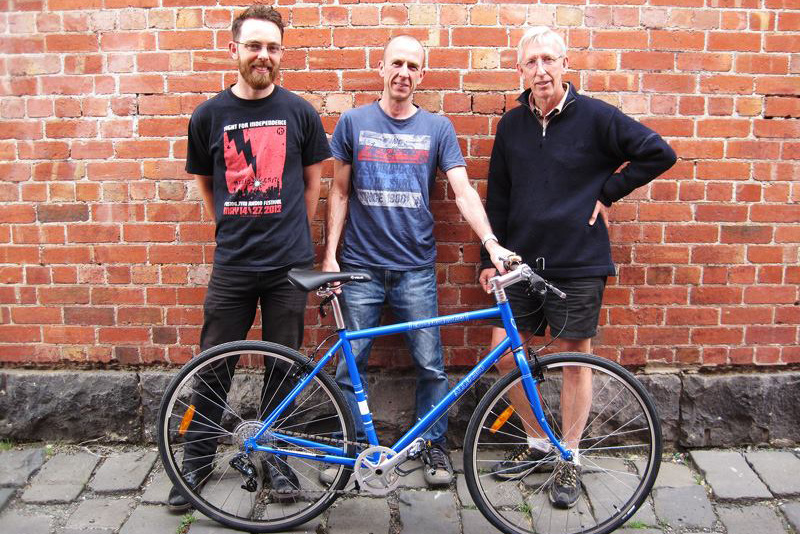Our Story
Diggari Pty. Ltd. was established in 2000 by cycling enthusiast Richard Ayling.
Richard has a lifetime’s experience in the cycling industry. Starting out as a road racer in the early 1970s, he was trained by the late Nino Borsari, an Olympic and Italian National Cycling Champion, and worked at Borsari Cycles. Richard also trained under the late Australian cycling legend Mario Giramondo, the two-time winner of the Melbourne to Warrnambool road race.
Richard stops to have a chat with an interested trucker somewhere between Melbourne and Canberra. Organised by Friends of the Earth Australia in 1975, this was the first bike ride against uranium mining.
Richard moved into bicycle design and distribution through the 1980s and 1990s. He began with Easton Sports as a designer and sales manager. Then he worked for Cannondale as an area manager, while managing the Cannondale-Volvo Cycling Team. That team included Mathew White, Matt Wilson and future winner of Le Tour de France Cadel Evans. The team was coached by Phil Anderson, who in 1981 was the first ever Australian to wear the yellow jersey at Le Tour.
The next stop was Peugeot, where Richard acted as a distributor for their products, and managed the highly successful Peugeot bicycle team that included Commonwealth Games gold medalist Scott Sunderland.

Putting together history and art: Richard’s very own Allegro custom-butted bicycle kitted out with Suntour Superbe Pro and Campy components.
From humble beginnings as a home-based niche business, Diggari grew as the reputation of the products spread.
With so much experience behind him he decided to set up his own business designing, manufacturing and selling functional commuter bicycles, as well as providing quality parts at affordable prices. Richard recognised that most mass-market commuting bicycles came with bottom-spec frames which were often heavy and poorly shod. Hence, the Allegro brand of bicycles was born, each built with high-quality steel or aluminium butted framesets found in much more expensive bicycles.
From humble beginnings as a home-based niche business, Diggari grew as the reputation of the products spread. Richard soon acquired agency for quality international products such as Ortlieb, Tubus, CarryFreedom. More products meant that more space was needed. Hence, Diggari moved into a charming triple-brick warehouse at 15 Little Bakers Lane in Northcote, Melbourne.
Over the years as Diggari continued to expand, we eventually outgrew our Northcote warehouse and in 2015, moved to our current home in Fairfield in Melbourne. With two mezzanines stocking well over a thousand unique SKUs, we made substantial upgrades to our IT systems.
Our powerful NetSuite (TM) cloud-based ERP (Enterprise Resource Planning) system synergises stock control, accounting and online B2B so we’re ready for the future of retail. Backorders and warranties are seamlessly handled. Our drop-ship facility helps our customers get products to their customers quicker than ever. A back-end panel helps our clients’ book-keepers and accounts keep a record of their transactions, on the cloud. We believe that technology and people can work hand-in-hand to deliver the best outcomes possible.

15 Little Bakers Lane, Northcote
Diggari’s philosophy is simple:
- Source only functional products of high quality at an affordable price point
- Minimise environmental impact and social exploitation at every step of production
- Support local design and production as much as possible
To this end Richard set up a special relationship with two suppliers: one located in Taichung, Taiwan, and the other in Vincenzia, Italy. This relationship involves a number of directives, primary among which is that all parts must be sourced from within a fifty kilometer radius of the plant, thereby minimising the carbon imprint of transporting parts for assembly. Other directives include fair pay for labour, and a manufacturing process free from toxic chemicals.
We believe that technology and people can work hand-in-hand to deliver the best outcomes possible.
This philosophy extends to the day to day running of the business and to the warehouse itself. The building itself is an example of recycling writ large. Minimal interior redesigning meant little use of new building materials. We recycle packaging and paper as much as possible. Natural light from windows and skylights bounce off mirrors and down stairwells. Other initiatives include passive heat dispersal for cooling. A plan is in place for the installation of solar paneling to generate electricity for heating and other needs.
Almost everything in our warehouse is sourced from recycled materials. Even the mechanic’s workbench.
“…at Diggari, we wear our hearts on our sleeves.”
Richard has always been a keen supporter of environmental and social causes. More than 5% of total revenue from the business go to supporting nonprofits – even in a quiet year. This doesn’t make business sense, you may ask, but at Diggari, we wear our hearts on our sleeves.
Bicycles are about mateship, bringing people together, sustainability and simply enjoying the great outdoors: even if one is just commuting to school or work. In an age of fast cars and of the modern, built-up urban environment, much of this gets lost in translation. Diggari’s philosophy is to extend the good practice of looking out for one another by supporting community projects and the local cycling fraternity as much as we can.

Richard (right) with PBS 106.7FM Melbourne’s Sam and Ray, the winner of our Allegro Edinburgh in PBS’ Spring Clean Your Conscience drive, 2014.

With so much experience behind him he decided to set up his own business designing, manufacturing and selling functional commuter bicycles, as well as providing quality parts at affordable prices. Richard recognised that most mass-market commuting bicycles came with bottom-spec frames which were often heavy and poorly shod. Hence, the Allegro brand of bicycles was born, each built with high-quality steel or aluminium butted framesets found in much more expensive bicycles.From humble beginnings as a home-based niche business, Diggari grew as the reputation of the products spread.


Diggari’s philosophy is simple:
- Source only functional products of high quality at an affordable price point
- Minimise environmental impact and social exploitation at every step of production
- Support local design and production as much as possible
We believe that technology and people can work hand-in-hand to deliver the best outcomes possible.

Richard has always been a keen supporter of environmental and social causes. More than 5% of total revenue from the business go to supporting nonprofits – even in a quiet year. This doesn’t make business sense, you may ask, but at Diggari, we wear our hearts on our sleeves.…at Diggari, we wear our hearts on our sleeves.

